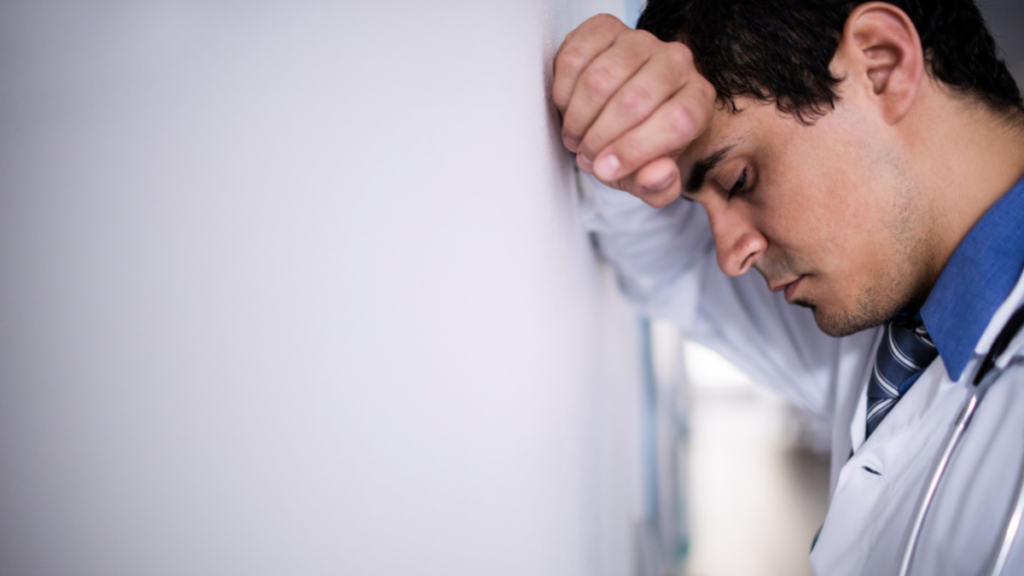Did you know, physicians have higher rates of depression than the general population?
Physicians die by suicide at a rate that is near double that of the general population, with an estimated 300 to 400 U.S. physicians taking their own lives every year. According to Medscape’s National Physician Burnout & Suicide Report 2021, thirteen percent of physicians have had thoughts of suicide. Additionally, a frightening one percent have attempted to take their own life. In recognition of Physician Suicide Prevention Day, let’s start the conversation surrounding physician suicide.
About 300 to 400 U.S. physicians die by suicide every year.
Burnout and Depression Start Early
From their undergraduate year to their career, physicians experience difficulties that challenge their mental health. Immediately, there is a normalization of high levels of stress, sleep deprivation, long workdays, and not enough time spent with loved ones.
Burnout and depression start early in medical school. Upon enrollment, medical students report lower levels of depression and a higher quality of life than their age-matched peers. Within months, their rates of burnout and suicide ideation exceed those of their peers. Twenty-eight percent of residents experience a major depressive episode during medical training.
Suicide is the number two cause of death among residents. It is the number one cause of death among male residents. The greatest number of residents that die by suicide are in their first year of graduate training after completing the formal four years of medical school.
Physicians have an inherently stressful job. Many are also balancing relationships and families, sustaining a heavy workload with long hours, and paying off a large loan balance. When not managed carefully, physicians can end up chronically stress and eventually burnt out.
Systemic Barriers that Discourage Treatment and Self-Care
Treatment can be a lifesaver for anyone experiencing poor mental health or thinking about suicide. Unfortunately, physicians who die by suicide are far less likely to seek treatment, often due to barriers to access to care, fear it will cost them their career, and the stigma in the medical community.
Mental health treatment can affect a physician’s ability to attain insurance for professional liability, disability, and health. Additionally, many physicians are concerned about being able to obtain a medical license, as many state medical boards ask about mental health when issuing licenses. There may also be increased difficulties in maintaining patient-provider confidentiality.
According to Medscape, most physicians reported that they have not sought help for burnout or depression because their symptoms are not severe enough. Many claimed that they should deal without help from a professional or they were too busy.
Twenty percent didn’t want to risk disclosure, while six percent don’t trust mental health professionals. Many feared that they would be reported to the medical board or their colleagues would find out.
Avoidance of treatment can worsen mental illness and even increase the risk of suicide.
Avoiding treatment can worsen mental illness and may even increase the risk of suicide.
How COVID-19 Worsened Suicide Among Physicians
COVID-19 has heightened stress for physicians, creating an increased risk of burnout, depression, and suicide. According to Medscape, PPE shortages, working longer hours under more stressful circumstances, and watching patients’ families suffer contributed to the everyday stress and exhaustion experienced by physicians.
Doctors Are Human
The physical and mental demands that modern medicine places on medical students, residents, practicing physicians, and their colleagues can all contribute to increased burnout and suicidality. At the end of the day, doctors are people. They get burnt out and overwhelmed just like anyone else. If you know a physician, or anyone else, struggling with their mental health or exhibiting signs that they may be contemplating suicide, the best thing you can do is show them that you care. Ask, “Are you okay?” or “How can I help?” It never hurts to ask someone how they are doing; it can make the biggest difference.
If you know someone struggling with their mental health, one of the best things you can do is show them you care.
Resources for Help
If you or someone you know is considering suicide, call Doctor Lifeline (1-888-409-0141), the National Suicide Prevention Lifeline (1-800-273-8255), en Español (1-888-628-9454); for TTY users: use your preferred service or dial 711 then 1-800-273-8255, go to suicidepreventionlifeline.org or text HOME to 741741.


